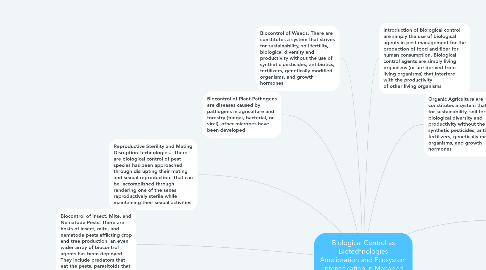Biological Control as Biotechnologies Amelioration and Ecosystem Intensification in Managed Ecosystems
by Laksamana Keris

1. Biocontrol of Weeds. There are constitutes a system that strives for sustainability, soil fertility, biological diversity and productivity without the use of synthetic pesticides, antibiotics, fertilizers, genetically modified organisms, and growth hormones
2. Biocontrol of Plant Pathogens are diseases caused by pathogens in agriculture and forestry (fungal, bacterial, or viral), other microbes have been developed.
3. Biocontrol of Insect, Mite, and Nematode Pests. There are hosts of insect, mite, and nematode pests afflicting crop and tree production, an even wider array of biocontrol agents has been deployed. They include predators that eat the pests, parasitoids that lay eggs
4. Biocontrol in Veterinary and Medical Applications. These pests are carriers of important human diseases, such as malaria, dengue, yellow fever, encephalitis, filariasis, and onchocerciasis or just a public nuisance
5. Production, Deployment, and Establishment of Biocontrol Agents. This deployment usually first requires that enough agent be produced to be introduced into the environment of the pest and to be effective in control
6. Natural Products, Plant Extracts, Essential Oils, Organic Acids, Hormones and Semiochemicals. There are natural products that can be used in the control of pest insects, weeds, plant pathogenic microbes, and nematodes may be produced and/or derived from insect, terrestrial plant, microbial, and synthetic sources for pest management.
7. Reproductive Sterility and Mating Disruption Technologies. There are biological control of pest species has been approached through disrupting their mating and sexual reproduction. That can be accomplished through rendering one of the sexes reproductively sterile while maintaining their sexual activities
8. Introduction of biological control are simply the use of biological agents in pest management for the production of food and fiber for human consumption. Biological control agents are simply living organisms (or are derived from living organisms) that interfere with the productivity of other living organisms
9. Organic Agriculture are constitutes a system that strives for sustainability, soil fertility, biological diversity and productivity without the use of synthetic pesticides, antibiotics, fertilizers, genetically modified organisms, and growth hormones
10. Genetic Engineering. In crop have incorporated biological control agents into the crop genome
11. Ecological Considerations. There are pest control strategies have underpinnings in the ecology of single species
12. Drivers. There are environmental and human health issues surrounding agricultural use of synthetic chemicals in general and pesticides in particular
13. Biocontrol for Protection of Beneficial Arthropods (Pollinators and Biocontrol Agents). Pollinators constitute a highly important guild of animals that require protection and encouragement.
14. Biocontrol of Plant Pathogens and Insect Pests by Pollinator Vectors. There are some microbial/fungal biocontrol agents has been the delivery system. Technology has been developed for the delivery of biocontrol agents by managed pollinators of Bacillus subtilis
15. Biocontrol of Vertebrate Pests. There are use of microbes has been directed against human beings in times of war through direct application of the agent, or by using intermediary vectors, such as insects to spread disease


